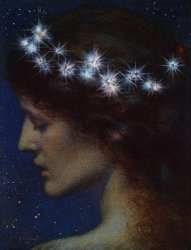 ND
thou art dead, as young and fair
ND
thou art dead, as young and fair
-
As aught of mortal birth;
-
And form so soft, and charms so rare,
-
Too soon return'd to Earth!
-
Though Earth receiv'd them in her bed,
-
And o'er the spot the crowd may tread
-
In carelessness or mirth,
-
There is an eye which could not brook
-
A moment on that grave to look.
-
-
I will not ask where thou liest low,
-
Nor gaze upon the spot;
-
There flowers or weeds at will may grow,
-
So I behold them not:
-
It is enough for me to prove
-
That what I lov'd, and long must love,
-
Like common earth can rot;
-
To me there needs no stone to tell,
-
'T is Nothing that I lov'd so well.
-
-
Yet did I love thee to the last
-
As fervently as thou,
-
Who didst not change through all the past,
-
And canst not alter now.
-
The love where Death has set his seal,
-
Nor age can chill, nor rival steal,
-
Nor falsehood disavow:
-
And, what were worse, thou canst not see
-
Or wrong, or change, or fault in me.
-
-
The better days of life were ours;
-
The worst can be but mine:
-
The sun that cheers, the storm that lowers,
-
Shall never more be thine.
-
The silence of that dreamless sleep
-
I envy now too much to weep;
-
Nor need I to repine
-
That all those charms have pass'd away,
-
I might have watch'd through long decay.
-
-
The flower in ripen'd bloom unmatch'd
-
Must fall the earliest prey;
-
Though by no hand untimely snatch'd,
-
The leaves must drop away:
-
And yet it were a greater grief
-
To watch it withering, leaf by leaf,
-
Than see it pluck'd to-day;
-
Since earthly eye but ill can bear
-
To trace the change to foul from fair.
-
-
I know not if I could have borne
-
To see thy beauties fade;
-
The night that follow'd such a morn
-
Had worn a deeper shade:
-
Thy day without a cloud hath pass'd,
-
And thou wert lovely to the last,
-
Extinguish'd, not decay'd;
-
As stars that shoot along the sky
-
Shine brightest as they fall from high.
-
-
As once I wept, if I could weep,
-
My tears might well be shed,
-
To think I was not near to keep
-
One vigil o'er thy bed;
-
To gaze, how fondly! on thy face,
-
To fold thee in a faint embrace,
-
Uphold thy drooping head;
-
And show that love, however vain,
-
Nor thou nor I can feel again.
-
-
Yet how much less it were to gain,
-
Though thou hast left me free,
-
The loveliest things that still remain,
-
Than thus remember thee!
-
The all of thine that cannot die
-
Through dark and dread Eternity
-
Returns again to me,
-
And more thy buried love endears
-
Than aught except its living years.
George Gordon Byron, 6th Baron
Byron, (22 January 1788 – 19 April 1824), commonly known
simply as Lord Byron, was an English poet and a leading figure
in the Romantic
movement. Amongst Byron's best-known works are the
brief poems She
Walks in Beauty, When We Two Parted, and
So,
we'll go no more a roving, in addition to the
narrative poems Childe Harold's Pilgrimage and Don
Juan. He is regarded as one of the greatest British poets and remains widely read and influential.
Byron was celebrated in life for aristocratic excesses including
huge debts, numerous love affairs with both sexes, rumours of a
scandalous incestuous liaison with his half-sister, and self-imposed
exile. He was famously described by Lady
Caroline Lamb as "mad, bad and dangerous to
know". He traveled to fight against the Ottoman
Empire in the Greek
War of Independence, for which Greeks still revere him as a national hero. He died merely 36 years old from a fever
contracted while in Missolonghi in Greece.

Home

